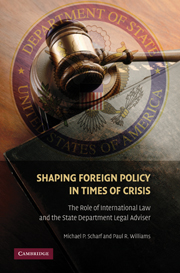 Shaping Foreign Policy in Times of Crisis
Shaping Foreign Policy in Times of Crisis Published online by Cambridge University Press: 05 June 2012
I WAS THE LEGAL ADVISER FOR THE FIRST ADMINISTRATION OF President George W. Bush, from April 2001 to February 2005. During these years the United States deployed its armed forces and engaged in military operations in Afghanistan, starting in October 2001, and Iraq, starting in March 2003. The legal issues involved in both of these instances were significantly different. I will discuss each of them and the role the Office of the Legal Adviser played in each of them in turn.
The Use of Force against Afghanistan
Our military operations in Afghanistan beginning in October 2001 and continuing today have been undertaken in self-defense against those responsible for the attacks on the United States on September 11, 2001. Those attacks made clear to all nations what had probably been the case for some years, namely that the organization Al-Qaeda, led by Osama bin Laden, was engaged in a campaign against the United States, its military forces, and its citizens wherever they might be. During the days and weeks after September 11, the Legal Adviser's Office worked with lawyers in the White House Counsel's Office, the Department of Justice and the Department of Defense to establish the legal basis for military operations we expected might be necessary to defend against further attacks. We drafted the UN Security Council Resolution that recognized our right to use force. We were in touch with lawyers in allied governments to share our understanding of their treaty obligations in the circumstances.
To save this book to your Kindle, first ensure no-reply@cambridge.org is added to your Approved Personal Document E-mail List under your Personal Document Settings on the Manage Your Content and Devices page of your Amazon account. Then enter the ‘name’ part of your Kindle email address below. Find out more about saving to your Kindle.
Note you can select to save to either the @free.kindle.com or @kindle.com variations. ‘@free.kindle.com’ emails are free but can only be saved to your device when it is connected to wi-fi. ‘@kindle.com’ emails can be delivered even when you are not connected to wi-fi, but note that service fees apply.
Find out more about the Kindle Personal Document Service.
To save content items to your account, please confirm that you agree to abide by our usage policies. If this is the first time you use this feature, you will be asked to authorise Cambridge Core to connect with your account. Find out more about saving content to Dropbox.
To save content items to your account, please confirm that you agree to abide by our usage policies. If this is the first time you use this feature, you will be asked to authorise Cambridge Core to connect with your account. Find out more about saving content to Google Drive.